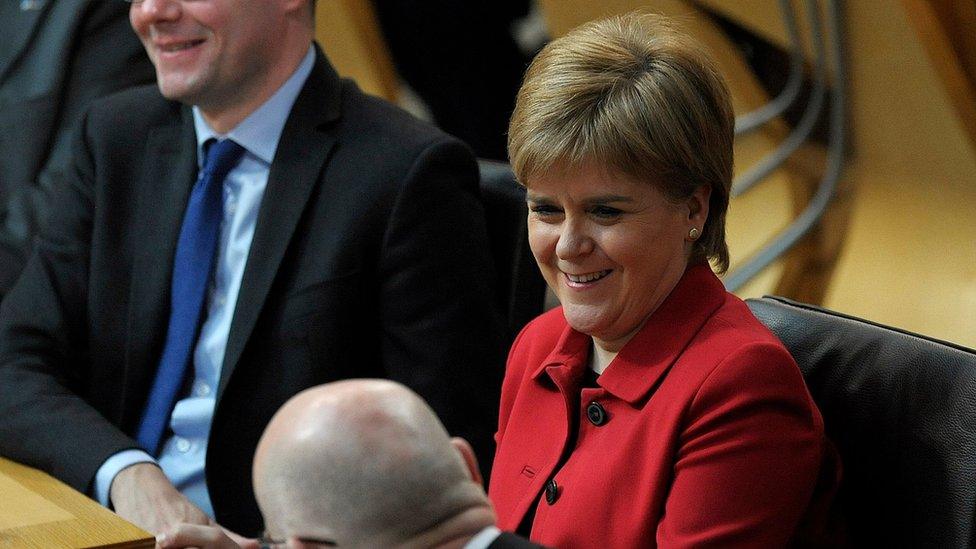Indyref2: All in the timing
- Published

The Scottish Parliament has voted to back a second independence referendum.
No surprise there, as the SNP and pro-independence Greens have a majority at Holyrood.
But the power to call a poll lies with Westminster - so the Holyrood parliament can press only for the start of negotiations about a date.
The parliament has endorsed the SNP leader Nicola Sturgeon's preferred timetable suggesting a referendum would "most appropriately be between the autumn of 2018, when there is clarity over the outcome of the Brexit negotiations, and around the point at which the UK leaves the EU in spring 2019".
The timing would have obvious advantages for the SNP - Theresa May would be distracted by Brexit and UK government departments would have little time to work on research designed to dent or destroy the economic case for independence.
The prime minister and her advisers are all too aware of this - so what happens if Theresa May continues to dig her heels in and not only repeats "now is not that time" but suggests 2019 won't be the time either?
Senior SNP sources dismiss the idea that, under these circumstances, Nicola Sturgeon will attempt to organise a 'consultative' referendum without Westminster agreement which would have no constitutional standing.
'A bit beyond'
So they will attempt to maintain pressure for a properly constituted, legally watertight referendum through sophisticated social media campaigning and - they hope - headline grabbing initiatives, such as declaring the economic case for independence is no longer reliant on oil revenues.
According to her public statements, Nicola Sturgeon is suggesting there should only be a little bit of wriggle room on the timing of that referendum - "a bit beyond" Brexit.
The reason for this is that the party's strategists have been conducting focus groups amongst those who firmly voted against independence last time. And they find that the timing argument is particularly resonant with those who voted No in the 2014 referendum and Remain in 2016.
Hence you will hear Nicola Sturgeon use phrases such as having a vote "before it's too late" to appeal to this group…though in reality, there seems little prospect of Scotland straightforwardly staying in the EU whenever a vote is held.
Incidentally, she will also continue to use very warm words to describe the contribution made by EU citizens to Scotland as it is hoped that many of them will change their vote from No - because they had been worried an independent Scotland would have been out of the EU - to Yes.
But privately the party's strategists are a little less concerned if the stated referendum timescale slips. Indeed, some relish the prospect.
They see Theresa May as their not-so-secret weapon.
Dangers
SNP strategists believe that the longer Theresa May sets her face against a referendum after Brexit the more she will build support for independence.
That's because they think some former No voters will object to her apparent disrespect for Scotland and be more open to the SNP's arguments that Westminster doesn't listen to the devolved Scottish parliament. And they point out they need just one in 20 voters to change their mind.
The SNP manifesto made it clear there should be a second referendum either if there were "a significant and material change in circumstances…such as Scotland being taken out of the EU against our will" or "if there is clear and sustained evidence that independence has become the preferred option for a majority of the Scottish people".
While only the first criterion has been met, it's the view of senior SNP figures that the longer the prime minister delays "Indyref2" the more likely it is that the party can meet both criteria.
But there are dangers.
The biggest fear is that Theresa May tries to push the timescale not just beyond Brexit but beyond the next Scottish parliament elections in 2021.
Of course, this would be denounced by Nationalists as a constitutional outrage.
Public opinion
But their private worry is that the SNP's mandate for a second referendum might run out.
The party currently forms a minority administration despite being more popular than their nearest rivals in Scotland - now the Conservatives, not Labour - by a wide margin. And it would take only a collapse in the vote of their (essential) independence allies, the Greens, in 2021 to put the project in jeopardy.
In part this explains the decision to go hammer and tongs for a referendum in this parliament - and even before some serious questions on the currency and the exact route back to the EU are settled.
But there is another challenge. Again privately, there are concerns about how the party will hold onto Yes voters who backed Brexit.
Any backsliding to appease them - settling for EEA membership, not full EU membership, for example - might in turn alienate the 'No-to-Yes Remainers'.
Nicola Sturgeon will undoubtedly confront these difficulties with boldness.
She has already ignored the advice of senior officials by calling for the second referendum before, and not after, Article 50 is triggered.
She is rather good at making the political weather.
But the polls suggest she hasn't yet changed the climate of Scottish public opinion.